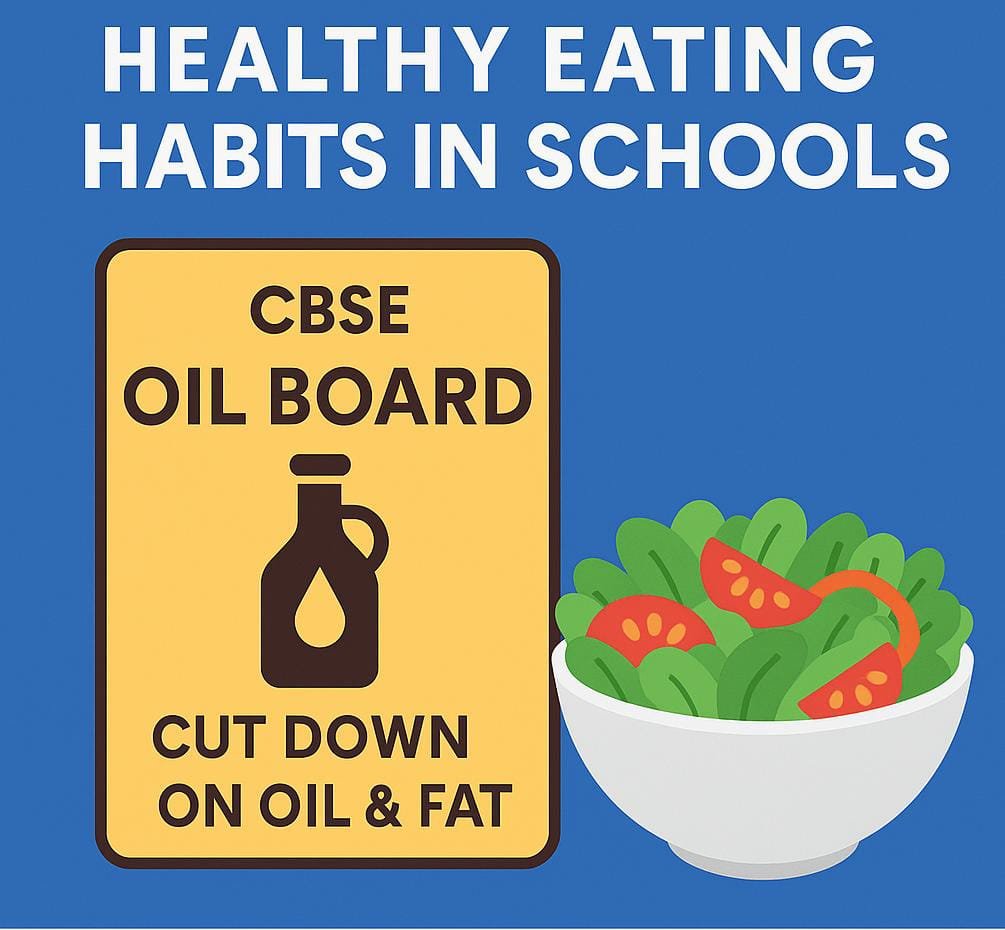
Students today are often drawn to snacks that are easy to grab but not always good for health. Chips, fried foods, and sugary drinks have become common in lunchboxes and canteens. At the same time, many students are not getting enough physical exercise. Together, these habits have led to an increase in weight-related health problems among school children.
To address this concern, the Central Board of Secondary Education (CBSE), has introduced a new idea. All CBSE-affiliated schools are now advised to set up Oil Boards in different parts of the school. These are not actual boards made of oil. The term Oil Board refers to displays, either digital or printed, that carry health messages about the risks of eating too much oily and fatty food.
These boards are meant to remind students to choose healthier options in their daily meals. They will be placed in common areas such as corridors, cafeterias, meeting halls, and staff rooms. The idea is that when students regularly see simple messages about healthy eating, they are more likely to remember and follow them.
This initiative is based on research from reliable health studies. One of the key sources is the National Family Health Survey, also called NFHS-5. According to its findings from 2019 to 2021, more than one in every five adults living in cities in India is overweight or obese. Another global report, the Lancet Global Burden of Disease study, has warned that if this trend continues, India could have around 440 million overweight or obese people by the year 2050. That would place the country among the highest in the world in terms of obesity.
Such figures are worrying, especially because these problems often begin in childhood. One of the major reasons behind this trend is the shift in eating habits. Many children eat food that is rich in fats, sugars, and salt. These choices are influenced by advertisements, social trends, or simply because such food is easily available. Along with this, there is a decrease in outdoor play and physical activity. Together, these factors are increasing health risks for young people.
CBSE believes that schools can play an important role in changing this situation. Since students spend a large part of their day in school, the environment around them can shape their daily choices. That is why CBSE has suggested that schools also include health messages from the Oil Board campaign in school diaries, report cards, newsletters, and other printed material. In this way, students will be reminded of these ideas not just during breaks, but throughout the school day.
This initiative also matches the messages being shared at the national level. Prime Minister Narendra Modi, in his popular radio programme Mann Ki Baat, has spoken about the need to reduce the use of cooking oil by at least ten percent. He has explained that small changes in our food habits can prevent many serious health issues later in life.
The Oil Board campaign is not just about putting up posters. It is a part of a larger effort to help students make better choices every day. When schools actively take part in this initiative, students are more likely to understand the benefits of eating well and staying fit. Teachers can discuss these ideas in science or health classes. Parents can support the same message by sending balanced meals from home. Even the school canteen can be encouraged to offer healthier options.
Health education should not be limited to a chapter in a textbook. It should be part of school life. When students see positive health messages every day, they begin to understand the value of nutritious food. When they hear the same messages from teachers and parents, they are more likely to follow them.
With nearly 45 crore people in India expected to become obese by 2050, action is needed today. It is better to prevent obesity than to treat it later. That is why CBSE’s Oil Board campaign is so important. It helps make hidden health risks more visible to students.
Good habits learned in school often stay for life. By encouraging healthy eating now, schools are helping build a healthier future for the entire country. This small step, taken together by students, teachers, and parents, can lead to big results over time.





















